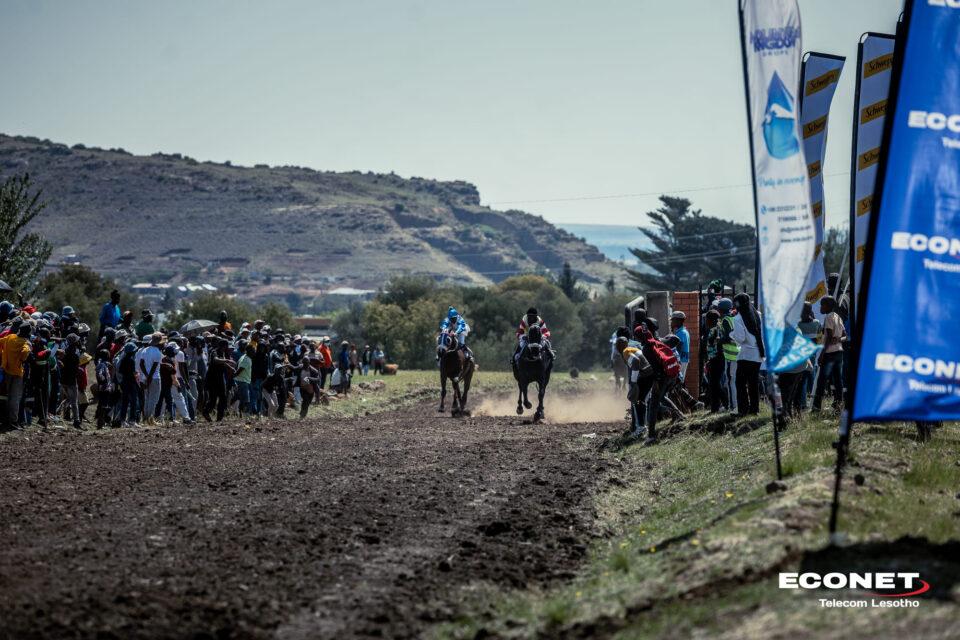Leemisa Thuseho
BITTER squabbles between the organisers, the Lesotho Jockeys Club and the Equestrian Association of Lesotho (EAL), caused the much-awaited horse racing event, The Royal Cup, to flop, the Lesotho Times can reveal.
This year’s edition was scheduled for 25 October at the Mohale’s Hoek Racecourse, but it was abruptly cancelled at the 11th hour, a day before the event.
By then, some jockeys had already arrived and pitched their tents in preparation.
In its cancellation notice, the Lesotho Jockeys Club did not state the exact reason for the decision but merely cited the need to “address safety and security concerns” before rescheduling the event.
Beyond the sport itself, the event was also meant to form part of the celebrations marking Their Majesties’ 25-year Silver Jubilee wedding anniversary. His Majesty King Letsie III and Queen ‘Masenate Mohato Seeiso got married in 2000.
However, the Lesotho Times has learned that the ongoing power struggle between the EAL and the Lesotho Jockeys Club caused the event to flop.
The EAL is an affiliate of the Lesotho Sports and Recreation Commission (LSRC), being the main government body responsible for overseeing sport and recreation. In contrast, the Lesotho Jockeys Club is an independent, legally registered organisation that focuses solely on promoting flat horse racing.
At the centre of the feud is EAL’s demand that the Jockeys Club should operate under its auspices as an affiliate, which the club has resisted, arguing that it is a legally recognised and autonomous body in its own right.
But the EAL maintains that it is the sole governing authority for equestrian sports in Lesotho, mandated to regulate, promote and protect the welfare of both horses and athletes. Therefore, it insists that it has the mandate to sanction all equine-related events.
Despite this, the Lesotho Jockeys Club has continued to host The Royal Cup without EAL’s full involvement.
According to sources, the EAL had raised concerns ahead of last year’s edition, hoping that this year the two organisations would cooperate — but that collaboration never materialised.
Speaking to the Lesotho Times, Lesotho Jockeys Club spokesperson, Phatšoane Tsuhlane, said the event was cancelled after they were informed by the Mohale’s Hoek Urban Council that the racecourse was unavailable.
The racecourse had been temporarily repurposed as a taxi rank and marketplace to accommodate vendors and transport operators during renovations at the main Mohale’s Hoek rank.
Tsuhlane said the organisers had developed a comprehensive working plan to ensure that the event would not interfere with the operations of vendors and taxis. He argued that since the stalls were not on the actual track, safety and security could have been maintained.
However, because of poor communication among the organisers — the Urban Council, and the EAL — that plan was never properly discussed.
“The race was cancelled after we got a letter from the Urban Council months ago informing us that we could not use the racecourse,” Tsuhlane said.
“We delayed responding because we were in discussions with the Minister of Sport regarding the event. Towards the race day, we were then accused of failing to respond to the Council’s letter — and that cost us the venue.”
Tsuhlane said while he acknowledges that there were problems with the venue, he still alleges EAL interfered through its affiliation with LSRC.
“We have discovered that the venue issue was not the real problem. The Equestrian Association under LSRC seems to have an interest in our races. They want us to affiliate under them, which we cannot do. We tried to register directly with LSRC, but they refused, saying we must join through EAL.”
He also said the organisers could have resolved the issue had the Urban Council engaged them directly, as they were prepared to present their safety plan.
For his part, EAL president, Khalanyane Lehora, said the association collaborates with district administrators and urban councils in granting approval for all equestrian events.
He confirmed that the Royal Cup was blocked purely because of safety concerns.
“The race failed because the organisers wanted to use a risky venue that has been turned into a taxi rank and vendors’ marketplace,” Lehora said.
He further revealed that last year, the EAL had even approached the event’s sponsors to remind them that to qualify for tax rebates under sports investment, they must work with officially recognised bodies, which in this case is EAL.
“We had hoped to work together this year, especially after LSRC president, Baba Malephane, facilitated talks between us and the Jockeys Club. Unfortunately, that did not happen,” Lehora added.
He said the EAL’s stance is guided by its duty to safeguard the integrity of equestrian sport and ensure the welfare of both animals and participants.
“We cannot have two bodies running equine sports in the country. However, I remain hopeful that a solution will be found soon.”


